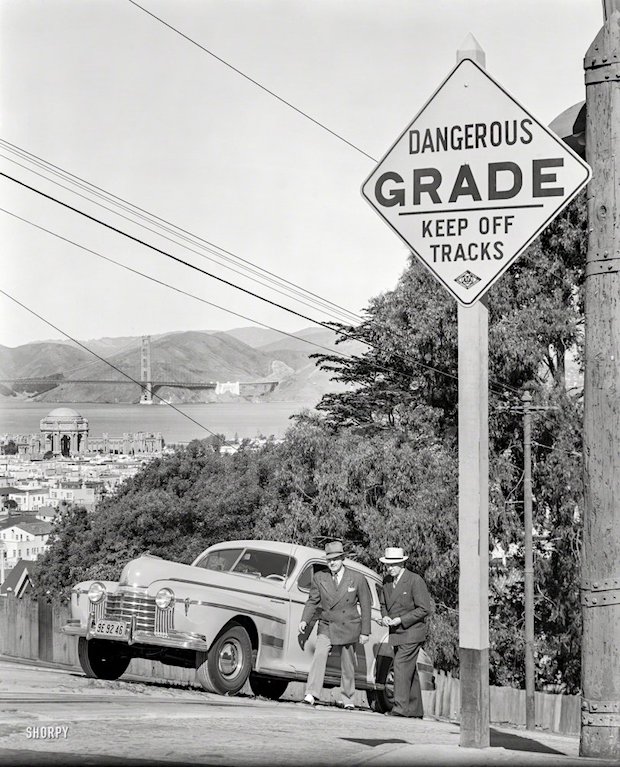
Wyland Stanley Pedestrians ascending steep grade, San Francisco 1940

• A record 2,909 Americans died of Covid in last 24 hrs;
• U.S. CDC reports 1,092,815 coronavirus cases, 64,283 deaths
• Russia had 10,633 new cases in 24 hours for the first time
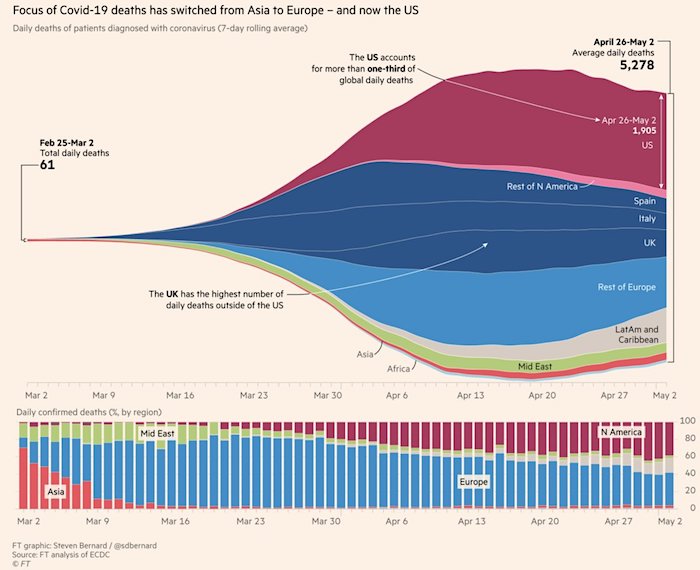

• Cases 3,500,652 (+ 83,170 from yesterday’s 3,417,482)
• Deaths 245,048 (+ 5,153 from yesterday’s 239,895 )

From Worldometer yesterday evening -before their day’s close-
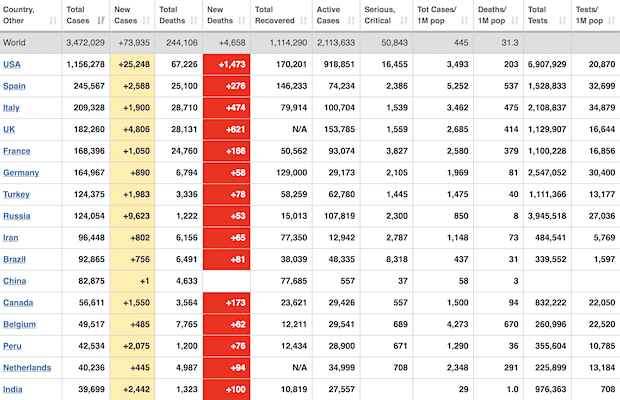
From Worldometer – Among Active cases, Serious/Critical fell to 2%
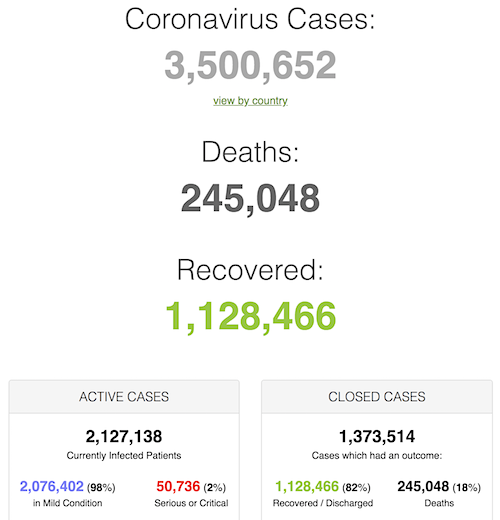
From SCMP:
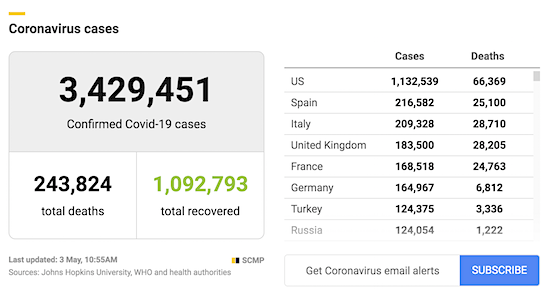
From COVID19Info.live:
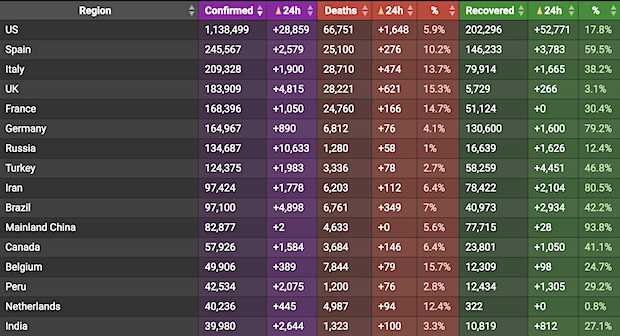

Yeah, sure, open it all up.
• The US Just Reported Its Deadliest Day For Coronavirus (CNBC) /span>
The United States just had its deadliest day on record due to the coronavirus as states across the country begin to ease restrictions meant to curb the spread of the virus, according to data published by the World Health Organization. The U.S. saw 2,909 people die of Covid-19 in 24 hours, according to the data, which was collected as of 4 a.m. ET on Friday. That’s the highest daily Covid-19 death toll in the U.S. yet, based on a CNBC analysis of the WHO’s daily Covid-19 situation reports. Before May 1, the next highest U.S. daily death toll was 2,471 reported on April 23, according to the WHO. State officials have previously warned that data on Covid-19 deaths are difficult to analyze because they often represent patients who became ill and were hospitalized weeks ago.
The country’s deadliest day comes as state officials weigh reopening parts of the economy and easing stay-at-home orders. Public health officials and epidemiologists have warned that as the public grows fatigued by restrictions and businesses reopen, the virus could spread rapidly throughout communities that have yet to experience a major epidemic. Protesters in at least 10 states on Friday demanded that the government lift stay-at-home orders and other emergency measures put in place to slow the spread of the coronavirus. Among the states that saw protests are California, Colorado, Delaware, Florida, Illinois, New Jersey, New Mexico, New York, Tennessee and Washington.
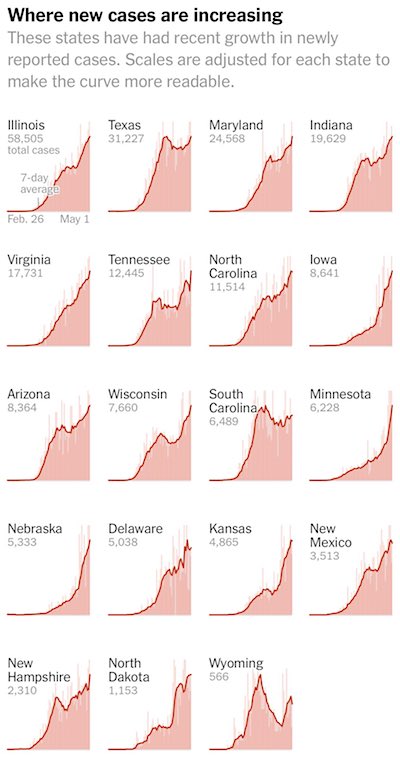
Dozens of states have unveiled reopening plans and several, including Georgia, South Carolina, Tennessee and Texas, have already begun to allow nonessential retailers to reopen. New York state, which has reported more than 27% of all confirmed cases in the U.S., according to data compiled by Johns Hopkins University, has borne the brunt of the U.S. outbreak so far. The state has reported at least 24,039 of the country’s 65,173 Covid-19 deaths, according to Hopkins. The toll of the deadliest day of Covid-19 in the U.S. rivals that of the September 11, 2001 terrorist attacks, which claimed the lives of 2,973 people in one day, according to a government commission.
The WHO data differs from data collected by the U.S. Centers for Disease Control and Prevention, which does not report historical daily Covid-19 deaths. The CDC’s site says that 2,349 people died in the U.S. of Covid-19 on May 1. However, the agency warns that its data might not be complete. CDC spokeswoman Kate Grusich told CNBC that the agency’s data is “validated through a confirmation process with jurisdictions.” “CDC does not know the exact number of COVID-19 illnesses, hospitalizations, and deaths for a variety of reasons,” the agency says, adding that asymptomatic patients, delays in reporting and limited testing make it difficult to accurately track the data.
BREAKING: Coronavirus Outbreak.
Some US states showing significant increase in cases, including: TX, IL, MD, MN, VA, IA pic.twitter.com/KGAPnTtT4I
— Yaneer Bar-Yam (@yaneerbaryam) May 2, 2020
NY, NJ doing better. MA the third state, not yet. Recent mask rule may help if people social distance seriously.
NY should limit travel soon from other states to continue to reduce cases. pic.twitter.com/8ncCYaZ0fm
— Yaneer Bar-Yam (@yaneerbaryam) May 2, 2020

More to add to the “We know nothing about the virus” pile.
• For Many COVID19 Patients Symptoms Last More Than A Month (BI)
When Lauren Nichols felt a dry, burning sensation in her throat, her first instinct was to laugh it off. “I joked at the start that I was a baby dragon in the making and I was going to be on ‘Games of Thrones,’” she said. A few hours later, she developed diarrhea. The next day, she had a low-grade fever, accompanied by body aches and pounding headaches. A week and a half later, Nichols started feeling short of breath. Just climbing a step ladder made her winded. “I usually walk about 5 to 6 miles a day and I’m very active, very healthy,” she said. “That was sort of my wake up call that this isn’t normal. There’s something going on.”
Nichols, who is 32 years old, got tested for the coronavirus on March 17 in Boston, Massachusetts, where she lives. Her test was positive, but her symptoms still haven’t gone away: Friday was day 51 of her illness. Nichols is still recovering at home. Not a day has passed in which she didn’t have diarrhea. Her appetite has disappeared, she sweats and shivers through the night, and there’s a rattling in her chest. Her second coronavirus test came back positive again on April 20. She is one of a growing number of young coronavirus patients with mild or moderate cases who have reported being sick for more than a month.
Three other patients under 40 gave Business Insider similar accounts of their illnesses. That contradicts guidance from the US Centers for Disease Control and Prevention, which has suggested that mild coronavirus symptoms typically last for 14 days. For severe or critical patients, the World Health Organization reports, recovery can last up to six weeks. But the limited nature of data about patients in recovery so far means we don’t have much information about how long symptoms typically last. In scientific studies, patients who are considered “recovered” are usually those who have been discharged from the hospital. Since mild cases are encouraged to stay home, they’re less likely to be reflected in that research.

Also new information.
• Women, Children Just As Likely To Get COVID19, Men Have Worse Symptoms (F.)
n analysis of COVID-19 cases in Shenzhen, China, found that infection rates in young children were no lower than the population average, and that women were roughly equally represented as men, but men were 2.5 times as likely to exhibit severe symptoms. The analysis of cases identified by the Shenzhen Center for Disease Control from January 14 to February 12 included 187 men and 204 women—but the men were 2.5-times more likely to have severe symptoms like respiratory or organ failure, according to the study, which was published Monday in The Lancet. Though children were less likely to develop severe symptoms, they were infected at the same rate as their adult counterparts, though the average age of those who tested positive for the disease was 45.
It took five days, on average, for patients in the study to manifest symptoms of COVID-19, but contact tracing and extensive testing reduced identification time to three days, as the study also looked at 1,286 close contacts of the 391 COVID-19 patients. Only 9% of the patients showed severe symptoms at their first doctor evaluation. On average, each patient infected 0.4 others with coronavirus, and 11.2% of these infections were among housemates; though researchers note this number is observational, it suggests that the “disease that will quickly die out instead of spreading” and is so low due in part “to the Shenzhen CDC’s efforts to detect and isolate the index cases and their contacts.” However, not all cases are created equal: 8.9% of patients known as superspreaders caused 80% of infections among contacts, which could “relatively easily reignite outbreaks.”

Never mind, just call them HEROES and you’re fine. Q: at what point do you get to be called a failed state?
• Half Of All New UK Infections Last Week Were Among Healthcare Workers (O.)
British scientists are racing to try to answer fundamental questions about the Covid-19 virus and its transmission before the lifting of the current national lockdown is approved by the government in the near future. Researchers say relaxing social distancing should occur only once it is understood why new infections of the disease are still being diagnosed in their thousands every day. Such a rate means efforts to test and trace infected contacts – a key plank in the government’s anti-Covid strategy in coming months – would be quickly overwhelmed. Far more information is needed about the way the coronavirus is transmitted, they say. The new data will feed into the debate about the settings in which lockdown will be lifted first – for instance, whether it’s relatively safe to stage outdoor events.
And last week, several groups launched studies aimed at providing answers. These include projects to analyse how virus-laden aerosols behave in the air in a bid to understand how the disease is passed between humans. In addition, other schemes will target healthcare workers to investigate how the virus is being spread to them from patients and then on to others. The importance of this latter approach was revealed in recent figures for cases of Covid-19 which have shown a drop in numbers of new cases in hospitals but reveal significant rises among health and social care workers. This point was stressed by epidemiologist Anne Johnson at University College London. She said cutting transmissions of Covid-19 to health and social care workers had now emerged as a major priority.
“Half of all new infections reported last week were among healthcare workers,” she told the Observer. “This has now become the leading edge of the spread of the disease.” Lack of protective equipment and clothing may have worsened the situation, she added. “However, what is certain is that care workers are still at risk from their patients from whom they can pick up the virus and, in turn, pass it on to their colleagues, to their own families and possibly to other patients. We need to focus on limiting the spread of Covid-19 among health and social care workers as an absolute priority if we want to have a chance of bringing this epidemic to a halt.”

I don’t really see how to call it a success.
• Is Sweden’s Covid-19 Handling a Failure or a Success? (Mish)
Sweden did not have a hard lockdown like its neighbors although people were advised to work from home when possible. It also banned nursing home visits on April 7. Sweden says its model worked, but Numbers Suggest a Different Story. Sweden’s Covid-19 deaths per capita are 3 to 6 times its Nordic neighbors.
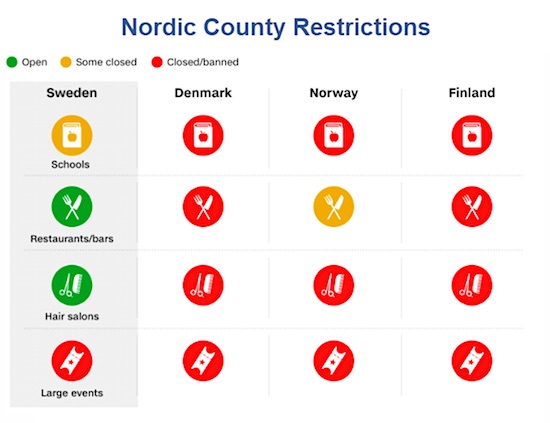
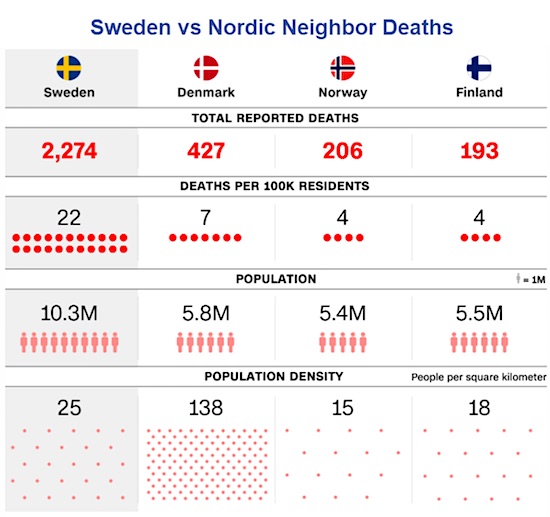
On a per capita basis, Sweden’s Covid-19 deaths are 3 to 5.5 times the other Nordic countries. Sweden has just over 3 times the death rate of Denmark. But note Denmark’s population density disadvantage of 138:25. Success is in the eyes of the beholder. A death rate 5.5x is acceptable to some but not others. But Sweden has a ton of pressure to under-report Covid deaths. I would be shocked if they didn’t. Regardless, one can easily look at this data, ignore the undercounts (perhaps even factor some in), and conclude Sweden did the right thing.

This is going to lead to real life battles.
• New Mexico Governor Quarantines Entire Town Over Coronavirus Outbreak (JTN)
New Mexico Gov. Michelle Grisham on Friday formally quarantined the entire town of Gallup, a decision she said came at the request of the city’s mayor as the municipality battles a rapidly spreading COVID-19 outbreak. In a press release on the New Mexico state website, the governor’s office announced Grisham had invoked New Mexico’s Riot Control Act, which the state said grants her the authority to “enact further temporary restrictions to mitigate the uninhibited spread of COVID-19.” The order shuts down all roads to and from Gallup. Businesses are ordered to be closed from 5 p.m. until 8 a.m. No more than two individuals may ride in a car at the same time.
And residents are urged to remain in their homes “except for emergency outings and those essential for health, safety and welfare.” Per state law, emergency declarations of this type only last three days. Grisham’s order is set to expire on May 4. In her Apr. 30 letter to Grisham, then-Gallup Mayor Jackie McKinney, who that same day was succeeded as mayor by Louis Bonaguidi, urged Grisham to enact the order to counteract the “unprecedented health crisis” the virus posed to her city and the surrounding county. McKinley County, in which Gallup is located, has seen 20 deaths from the coronavirus out of a little over 1,000 confirmed cases.

Saudi Arabia is becoming a hit fast.
• Saudi To Take ‘Strict, Painful’ Measures To Deal With Coronavirus Impact (R.)
Saudi Arabia will take strict and painful measures to deal with the economic impact of the coronavirus pandemic, the finance minister said on Saturday, adding that “all options for dealing with the crisis are open”. “We must reduce budget expenditures sharply”, Mohammed al-Jadaan said in an interview with Al Arabiya TV, adding that the impact of the new coronavirus on Saudi Arabia’s state finances will appear from the second quarter of the year. “Saudi finances need more discipline and the road ahead is long,” he said. One measure would be to slow down government projects, including mega-projects, to reduce spending, he said.
The world’s largest oil exporter is suffering from historically low oil prices, while measures to fight the coronavirus are likely to curb the pace and scale of economic reforms launched by Crown Price Mohammed bin Salman. Saudi Arabia’s central bank foreign exchange reserves fell in March at their fastest rate in at least 20 years, hitting their lowest level since 2011, while the kingdom slipped to a $9 billion budget deficit in the first quarter as oil revenue collapsed. Jadaan said last month that Riyadh could borrow $26 billion more this year while it would draw down up to $32 billion from its foreign reserves to finance the deficit. On Saturday Jadaan told Al Arabiya Saudi Arabia had used some revenue from investments to plug the deficit, and that the crisis presented investment opportunities.
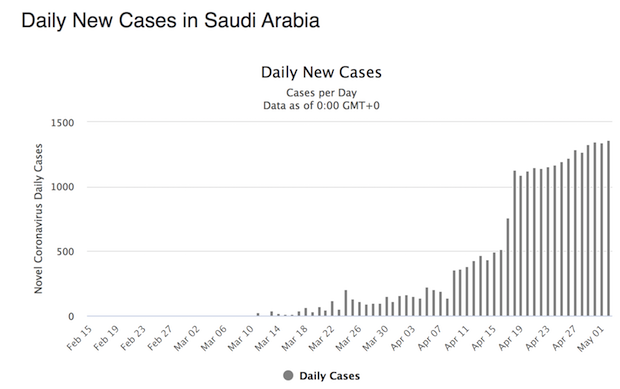

Ease a little and then flare back up.
• Italy’s Daily Coronavirus Death Toll Jumps, New Cases Stable (R.)
Deaths from the COVID-19 epidemic in Italy jumped by 474 on Saturday, against 269 the day before, the Civil Protection Agency said, posting the largest daily toll of fatalities since April 21. The steep increase in deaths followed a long, gradual declining trend and was due largely to Lombardy, the country’s worst affected region, where there were 329 deaths in the last 24 hours compared with just 88 the day before. The daily tally of new infections was broadly stable for a third day running at 1,900 against 1,965 on Friday.
The total death toll since the outbreak came to light on Feb. 21 now stands at 28,710, the agency said, the second highest in the world after that of the United States. The number of confirmed cases amounts to 209,328, the third highest global tally behind those of the United States and Spain. People registered as currently carrying the illness fell to 100,704 from 100,943 on Friday. There were 1,539 people in intensive care on Saturday, slightly down from 1,578 on Friday and maintaining a long-running decline. Of those originally infected, 79,914 were declared recovered against 78,249 a day earlier.

“..the ancestor of Sars-CoV-2, the virus causing COVID19, might have left bats between 50 and 70 years ago..”
• French Coronavirus Strain Did Not Come From China Or Italy (SCMP)
The coronavirus outbreak in France was not caused by cases imported from China, but from a locally circulating strain of unknown origin, according to a new study by French scientists at the Institut Pasteur in Paris. Genetic analysis showed that the dominant types of the viral strains in France belonged to a clade – or group with a common ancestor – that did not come from China or Italy, the earliest hotspot in Europe. “The French outbreak has been mainly seeded by one or several variants of this clade … we can infer that the virus was silently circulating in France in February,” said researchers led by Dr Sylvie van der Werf and Etienne Simon-Loriere in a non-peer reviewed paper released on bioRxiv.org last week.
The Covid-19 pandemic has infected more than 128,000 people in France and caused more than 23,000 deaths. France detected the virus in late January, before any other country in Europe. A few patients with a travel history that included China’s Hubei province were sampled on January 24 and tested positive. Benjamin Neuman, professor and chair of biological sciences with the Texas A&M University-Texarkana, said the French strains might have come from Belgium, where some sequences most closely related to the original strain from China were clustered.
“Since the earliest European strains of [the coronavirus] Sars-CoV-2 seem to be associated with Belgium, the idea that the virus spread from Belgium to both Italy and France at around the same time seems plausible, as this paper contends,” he said. France is the latest in a growing number of countries and areas where no direct link between China and local outbreaks could be established. The dominant strains in Russia and Australia, for instance, came from Europe and the United States, respectively, according to some studies.
[..] Some prominent scientists, including Francis Collins, director of the US National Institutes of Health, said the virus might have been spreading quietly in humans for years, or even decades, without causing a detectable outbreak. The virus had thus adapted well to the human body. Some genes regulating its binding to host cells were similar, or even identical, to those found in some other highly infectious human viruses, such as HIV and Ebola. According to some estimates, the ancestor of Sars-CoV-2, the virus causing Covid-19, might have left bats between 50 and 70 years ago. A recent study by a team of geneticists in Oxford University estimated the first outbreak of the current pandemic could have occurred as early as September last year.

That’s at the very least 3 months too late.
• France Set To Impose 14-Day Coronavirus Quarantine For Travellers (R.)
Travellers to France, including French citizens returning home, will face a compulsory two-week quarantine and possible isolation when they arrive in the country to help slow the spread of coronavirus, the health minister said on Saturday. France, which has been the fifth-hardest hit country with 24,594 deaths from COVID-19, is preparing to gradually lift lockdown measures from May 11. The new quarantine rules, however, will be included in a decree specifying measures laid out in a bill extending a state of emergency until July 24, a move that allows the government to restrict freedom of movement.
“This quarantine will be imposed on any person returning on French soil,” Health Minister Olivier Veran told a press briefing after the weekly cabinet meeting. He said the duration and conditions of both quarantine for asymptomatic people and isolation for those showing symptoms of COVID-19, the flu-like disease caused by the new coronavirus, would be defined in a decree to be published. Decisions to isolate people would be scrutinised by judges to ensure they are justified and fair, he added. It was not immediately clear whether the quarantine would only apply to people arriving from outside Europe’s open-border Schengen area, whether they would need to self-isolate at home or in hotels, and for how long the measures would be in place.

Incompetence as an official statement.
Many of these countries have strong medicine industries. And only now …..
• European Leaders Join Forces To Combat COVID19 (PA)
European leaders have pledged to raise billions of pounds to help find a vaccine and treatments for Covid-19 as part of an “international alliance” fighting the disease. An online pledging conference due to be held on Monday will aim to pull in raise €7.5bn in funding to support the global response to the coronavirus pandemic. Writing in the Independent newspaper, the leaders of France, Germany, Italy and Norway and senior EU officials said the outbreak had “caused devastation and pain in all corners of the world”. They said responding to the “global challenge” required “bringing together the world’s best – and most prepared – minds to find the vaccines, treatments and therapies we need to make our world healthy again”.
This would accompany “strengthening the health systems that will make them available for all, with a particular attention to Africa”. The politicians declared their support for the World Health Organization (WHO) and backed the recent launch of the “Access to Covid-19 Tools (ACT) Accelerator”. The “global cooperation platform” aims to accelerate research, development, access and distribution of a Covid-19 vaccine and other treatments, the leaders wrote, adding that it has “laid the foundation for a real international alliance to fight Covid-19”. Money pledged through the online conference on Monday will make up a global funding “shortfall” estimated by the Global Preparedness Monitoring Board (GPMB) – an independent monitoring and accountability body that ensures preparedness for global health crises – and others.

“One of the more worrying consequences of the coronavirus..”?
I think it’s one of the few positives.
• China Faces Economic Reckoning As World Turns Against Globalisation (SCMP)
One of the more worrying consequences of the coronavirus is that it looks likely to become a catalyst for deglobalisation. At the centre of this will be the decoupling of the Chinese economy with developed economies and the US in particular. The world’s three largest free economies – the European Union, the United States and Japan – are all drawing up separate plans to lure their companies out of China. EU trade commissioner Phil Hogan has called on companies to consider moving away from China; US President Donald Trump’s top economic adviser Larry Kudlow has said the government should pay the costs of American firms moving manufacturing back from China onto US soil; and Tokyo has unveiled a US$2.2 billion fund to tempt Japanese manufacturers back to Japan or even to Southeast Asia.
Meanwhile, bills are piling up in the US Congress aimed at reducing America’s reliance on Chinese supply chains and pushing for a decoupling of the world’s two largest economies. While these are recent moves, the truth is the debate on globalisation – and deglobalisation – began more than a decade ago in the wake of the global financial crisis of 2008. After decades of globalisation in trade, capital flows and even people-to-people exchanges, the trend has reversed over the past decade as trade and financial integration stalled.

I changed the headline to reflect what the article inadvertently says.
• PPP Program Was Not Designed To Help Small Business (BI)
As the federal government’s aid to businesses affected by the coronavirus pandemic has gone out, a curious new breed of public moralizer has emerged: the wealthy businessman or their political allies angry at businesses getting money that isn’t “meant for them.” People are angry at larger companies that participate in the Paycheck Protection Program, a loan fund created by the CARES Act and administered through banks and the Small Business Administration to help ease the economic pain of the pandemic. The program is designed to give generous loans that would cover 2.5 times the monthly payroll of a qualified business and that loan would then be forgiven if they were spent on a few categories of expenses — most notably paying employees.
The program has been castigated by critics across the political spectrum for a slew of issues, most notably for letting larger companies participate who may not seem like a “small business.” In particular, this criticism is directed at companies that are publicly traded and thus might be able to tap to the equity markets for funding. But it’s not a failing of the PPP that some larger companies got money — the program was designed to include them and, if the purpose of it was to protect employment, then letting a wider as opposed to a narrower range of companies participate could be helpful. The PPP, despite getting another infusion of $320 billion on top of the $349 billion already disbursed, has clearly been underfunded and, second, its actual goal of protecting employment has been confused with its marketing as a way to assist sympathetic small businesses.
The PPP deliberately designed its rules so that large restaurants could access the funding, leading to name brands like Shake Shack, steakhouse chain Ruth’s Chris, sandwich chain Potbelly and others getting checks. This stirred up substantial opprobrium as many truly small businesses have received nothing so far. After the uproar, Shake Shack founder Danny Meyer and the company’s chief executive Randy Garutti took to LinkedIn to say that the burger chain would give back its $10 million loan, while the sushi chain Kura Sushi said it would return its $6 million in PPP funding, along with Ruth’s Chris. None of these companies are “small businesses,” but their qualification under the plan isn’t a “loophole” — it was deliberate. The Treasury’s guidance specifically says that hotels and restaurants get special treatment under the plan, specifically that the standard is that if there are 500 or fewer employees per location, not for the entire business.
“Few, if any restaurants in America employ more than 500 people per location. That meant that Shake Shack — with roughly 45 employees per restaurant – could and should apply to protect as many of our employees’ jobs as possible,” Meyer and Garutti wrote on LinkedIn. Marcus Lemonis, the CNBC host and Camping World chief executive, has been on the warpath against public companies who’ve participated, tweeting, “We will not and cannot accept this… it’s go time… as the largest shareholder of a public company I cannot stand by and watch this… public companies can sell equity or raise debt,” and “These companies have alternative avenues of raising capital…. no excuses… and I will make it my mission to find out why.”

“.. “we” includes many other creatures and societies in our biosphere and even in ourselves. Even as an individual, you are a biome, an ecosystem, much like a forest or a swamp or a coral reef. ”
• The Coronavirus Is Rewriting Our Imaginations (NYer)
The critic Raymond Williams once wrote that every historical period has its own “structure of feeling.” How everything seemed in the nineteen-sixties, the way the Victorians understood one another, the chivalry of the Middle Ages, the world view of Tang-dynasty China: each period, Williams thought, had a distinct way of organizing basic human emotions into an overarching cultural system. Each had its own way of experiencing being alive. In mid-March, in a prior age, I spent a week rafting down the Grand Canyon. When I left for the trip, the United States was still beginning to grapple with the reality of the coronavirus pandemic. Italy was suffering; the N.B.A. had just suspended its season; Tom Hanks had been reported ill.
When I hiked back up, on March 19th, it was into a different world. I’ve spent my life writing science-fiction novels that try to convey some of the strangeness of the future. But I was still shocked by how much had changed, and how quickly. Schools and borders had closed; the governor of California, like governors elsewhere, had asked residents to begin staying at home. But the change that struck me seemed more abstract and internal. It was a change in the way we were looking at things, and it is still ongoing. The virus is rewriting our imaginations. What felt impossible has become thinkable. We’re getting a different sense of our place in history. We know we’re entering a new world, a new era. We seem to be learning our way into a new structure of feeling.
[..] Margaret Thatcher said that “there is no such thing as society,” and Ronald Reagan said that “government is not the solution to our problem; government is the problem.” These stupid slogans marked the turn away from the postwar period of reconstruction and underpin much of the bullshit of the past forty years. We are individuals first, yes, just as bees are, but we exist in a larger social body. Society is not only real; it’s fundamental. We can’t live without it. And now we’re beginning to understand that this “we” includes many other creatures and societies in our biosphere and even in ourselves. Even as an individual, you are a biome, an ecosystem, much like a forest or a swamp or a coral reef.
Your skin holds inside it all kinds of unlikely coöperations, and to survive you depend on any number of interspecies operations going on within you all at once. We are societies made of societies; there are nothing but societies. This is shocking news—it demands a whole new world view. And now, when those of us who are sheltering in place venture out and see everyone in masks, sharing looks with strangers is a different thing. It’s eye to eye, this knowledge that, although we are practicing social distancing as we need to, we want to be social—we not only want to be social, we’ve got to be social, if we are to survive. It’s a new feeling, this alienation and solidarity at once. It’s the reality of the social; it’s seeing the tangible existence of a society of strangers, all of whom depend on one another to survive. It’s as if the reality of citizenship has smacked us in the face.
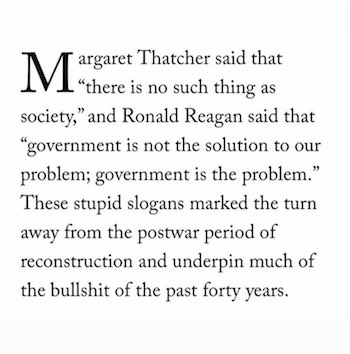

The real patriot. Watch airline shares Monday morning. He owned 10 or so of each company.
• Warren Buffett Sold All His Airline Stocks (MF)
Warren Buffett has bailed on the airlines, with Berkshire Hathaway selling its entire stakes in Delta Air Lines, Southwest Airlines, American Airlines and United Airlines. Airline stocks have been hard hit by the COVID-19 pandemic, with travel demand all but evaporating. Most airline stocks have lost half of their value or more this year as a result, with the industry now focused more on survival than earnings growth. Speaking at Berkshire’s annual meeting on Saturday, Buffett said he did not sell due to the declining share prices. Rather, “I just decided that I’d made a mistake.” The announcement is sure to put further pressure on airline shares, as investors have made a lot of money over the years doing as Buffett does. But is the Oracle of Omaha right this time around?
Berkshire has a long and turbulent history with the airlines. Three decades ago, he bought shares in USAir (now part of American) but ended up writing off much of that investment. In 2001, he swore off the industry, declaring that “if capitalists had been present at Kitty Hawk when the Wright brothers’ plane first took off, they should have shot it down.” But in recent years he warmed to the sector, becoming one of the largest shareholders in each of the four biggest U.S. airlines. The industry in the late 2000s went through a period of restructuring and consolidation that reduced the number of competitors chasing every passenger and allowing all the remaining participants to be more profitable.
Buffett was so enamored with airlines that in 2019 he broke one of his cardinal rules and allowed Berkshire’s position in Delta, and then Southwest, to climb above the 10% threshold. Crossing 10% led to Berkshire having to make more disclosures about its stakes in those carriers, which back in early April gave us our first hints Berkshire was selling.
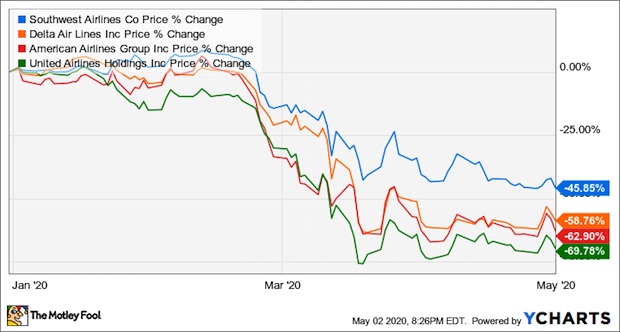

He doesn’t want it to be a crowded trade.
• Buffett Says: ‘Never Bet Against America’ (F.)
Billionaire investor Warren Buffett, speaking at Berkshire Hathaway’s first-ever virtual shareholders meeting on Saturday, said that he is optimistic that the U.S. economy can bounce back and overcome coronavirus. While Buffett admitted that “we haven’t faced anything that quite resembles this problem” before, he said that the United States has “faced tougher problems” and overcome them in the past. “I remain convinced… nothing can basically stop America,” he said. “The American miracle, the American magic has always prevailed and it will do so again.” Buffett acknowledged that the virus is “still hard to evaluate” and “we’re learning as we go along,” though he says that he does take solace in the fact that it is “not as lethal as it may have been.”
While he is optimistic about America’s economic future, Buffett said that the fallout from coronavirus is still unclear—and hard to compare to past crises: “In 2008-2009, our economic train went off the tracks,” he described. “This time, we just pulled the train off the tracks and put it on a siding.” The Oracle of Omaha took a big-picture view to demonstrate his optimism about the economy: The United States today is “an incredibly more wealthy country than we were in 1789.” He calculated that the net worth of the United States in 1789 amounted to around $1 billion, while the wealth of the country today is well over $100 trillion: “That’s mind blowing,” he said. “In the end, the answer is: Never bet against America,” Buffett said.
BIG NUMBER: $49.75 BILLION That’s how much Buffett’s investing conglomerate, Berkshire Hathaway, lost in the first quarter. The company reported a massive net loss of nearly $50 billion, as the coronavirus-driven market sell-off took a significant toll on the company’s stock holdings. U.S. economic activity plunged during the first quarter, with GDP contracting by 4.8%—the biggest downturn since the 2008 financial crisis. The benchmark S&P 500 index had fallen over 30% by late March, before recouping some of those losses in April: It’s now down 13% so far in 2020.
“We’re about to have deflation and the market hasn’t figure it out yet… when it does, the Fed is going to shit itself.” @hendry_hugh @raoulGMI
https://t.co/aa7m6eTwgC pic.twitter.com/sqGMdUvTDZ— Real Vision (@RealVision) May 1, 2020

We try to run the Automatic Earth on people’s kind donations. Since their revenue has collapsed, ads no longer pay for all you read, and your support is now an integral part of the process.
Thanks for your generosity.

Such a great friendship pic.twitter.com/aVx0wvzPl2
— Life on Earth (@planetpng) May 2, 2020

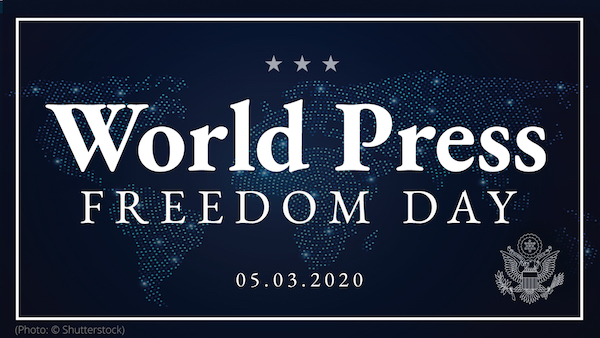


Support the Automatic Earth for your own good.







